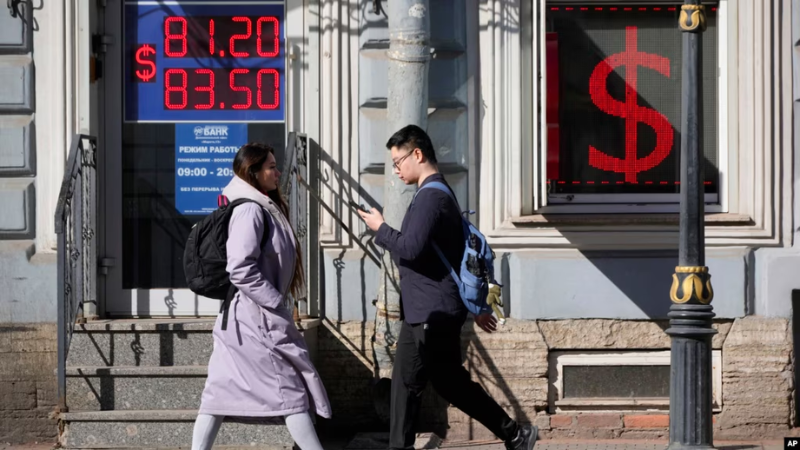
In Russia’s War Economy, The Warning Lights Are Blinking
By Mike Eckel, Fletcher alum and Senior News Correspondent at RFERL
Prices of milk, potatoes, and butter are soaring in Russia. Retailers are beefing up security to prevent shoplifting. Mortgage rates are skyrocketing as the sales of new apartments plummet.
More than 1,000 days since Moscow launched its all-out invasion of Ukraine, Russia has transformed its economy, retooling it to fuel the war effort and cope with Western sanctions.
Government spending on things like tank production, missile manufacturing, and military uniforms has spurred growth across the country. Extraordinarily high wages paid to volunteer soldiers — and bonuses and benefits paid to widows — have sent a flood of money into poorer regions.
On the flip side, inflation is skyrocketing. The Central Bank has struggled to tame inflation, hiking the key interest rate to 21 percent in October, the highest level in over 20 years.
The warning lights, experts say, are blinking. There are fears of a rising tide of corporate bankruptcies as companies drive up wages, struggling to attract employees from a shrinking labor pool. Mortgage rates, driven up by the Central Bank, meanwhile, are scaring off homebuyers in a growing number of regions.
“The market is dead,” a real estate agent who requested anonymity to avoid scrutiny from the authorities told Current Time. “It’s frozen right now, and nothing is happening at all.”
Economic growth is “slowing down undeniably,” said Laura Solanko, senior adviser at the Bank of Finland’s Institute for Economics in Transition.
“The economy is overheated, and the growth rate has to slow down,” she said. “But very slow growth — or no growth at all — does not indicate the economy is about to collapse. What it means is slower investments and cuts in some public spending in the quarters ahead.”
Government spending on the war effort drove GDP growth last year to 3.6 percent despite sweeping Western sanctions and efforts to cut off trade with Russia. This year, forecasts predict the economy will grow 3.9 percent.
Unemployment, meanwhile, dropped to 2.4 percent in September, with labor shortages helping to drive up wages.
High interest rates have not only affected the real estate market. Rising corporate debt has made it significantly more expensive for companies to take out loans to expand operations — or to raise wages to compete with workers who choose to sign up to fight in Ukraine. In some regions, men can receive the equivalent of one year’s wages just for enlisting.
Among business leaders and corporate executives, discontent with the Central Bank has already bubbled to the surface.
Sergei Chemezov, head of the state-run industrial conglomerate Rostec and an ally of President Vladimir Putin, complained before the most recent hike that high interest rates were “a serious brake on further industrial growth.”
“Conservative financial policy can lead to stagflation,” Chemezov added.
“At the current rate, it is more profitable for companies to stop development, [and] even reduce the scale of business and put its funds on deposit, than to conduct business and bear the associated risks,” Aleksei Mordashov, a Kremlin-connected oligarch who heads the largest steel company in Russia, said in October.
Chemezov and other business leaders have also warned of an uptick in corporate bankruptcies.
The Central Bank itself is anticipating a slowdown because of the rate hikes. In 2025, growth is expected to shrink between 0.5-1.5 percent.
Experts say there is a danger that Central Bank policy drives the economy into stagflation, a combination of slowing growth and stubbornly high inflation. A government-linked think tank warned as much in a report released on November 13.
“The current high level of the key interest rate and the indicated prospects for further increases have created a risk of economic downturn and a collapse in investments in the near future,” the report said.
Central Bank head Elvira Nabiullina appeared to defend some of the institution’s fiscal policies and tried to reassure critics. She also dismissed the danger of stagflation.
“The Russian economy is at a turning point, and a slowdown in inflation can be expected in the coming months,” she said.
Moscow will not “mind some bankruptcies” said Janis Kluge, an expert on the Russian economy at the German Institute for International and Security Affairs, because they are “needed to bring inflation under control.”
Bankruptcies “should also help recruitment” of men to fight in Ukraine, he said, since Russians “who can’t pay back their debt are more likely to agree to” enlist.
“Overall, the economic situation will become much more complicated for Russia,” Kluge said.
“For almost three years, it seemed like everybody was getting rich in this war. But now, it becomes clear that this is not going to happen, and there is a price to pay.”
(This post is republished from RFERL.)
